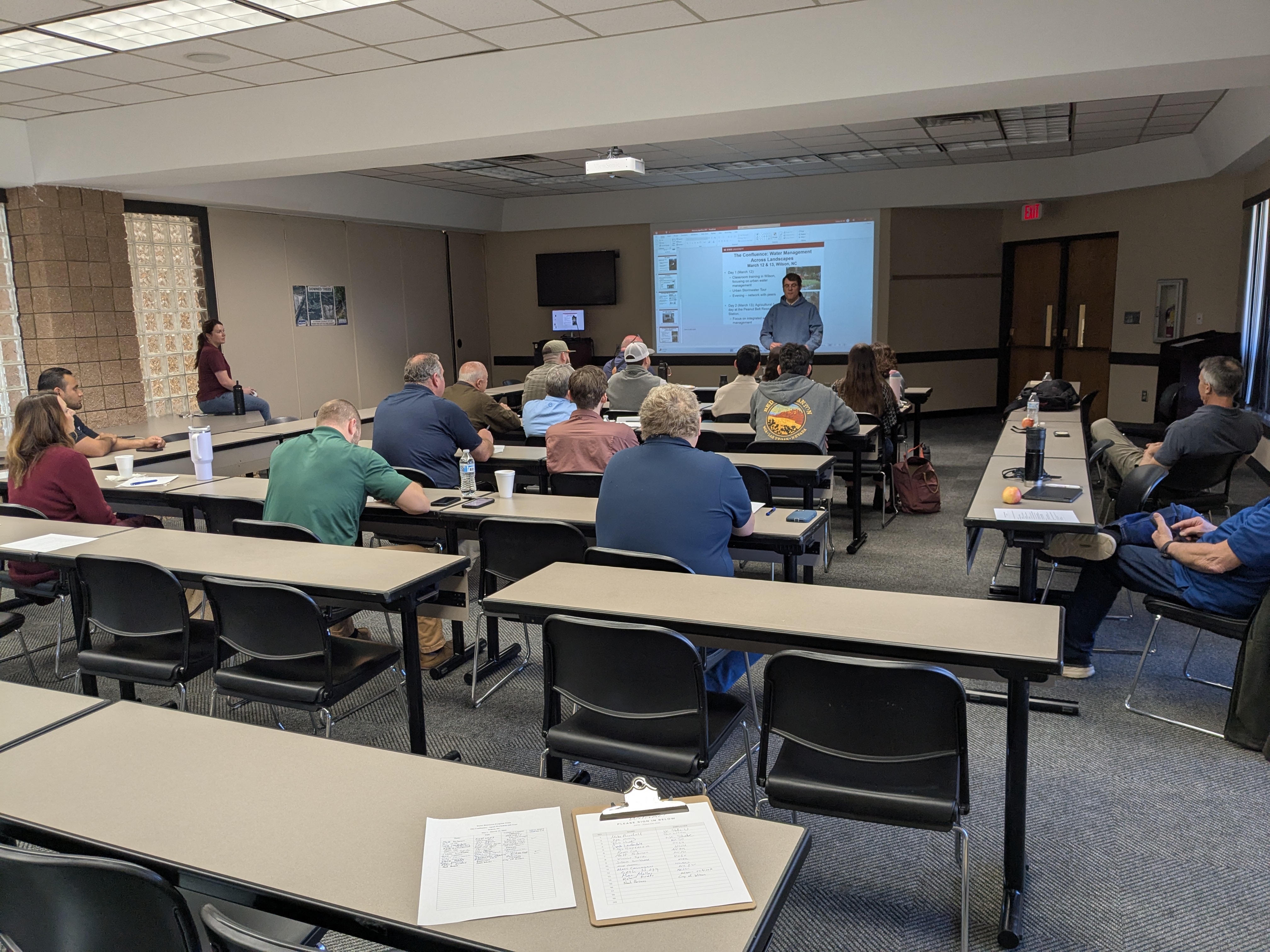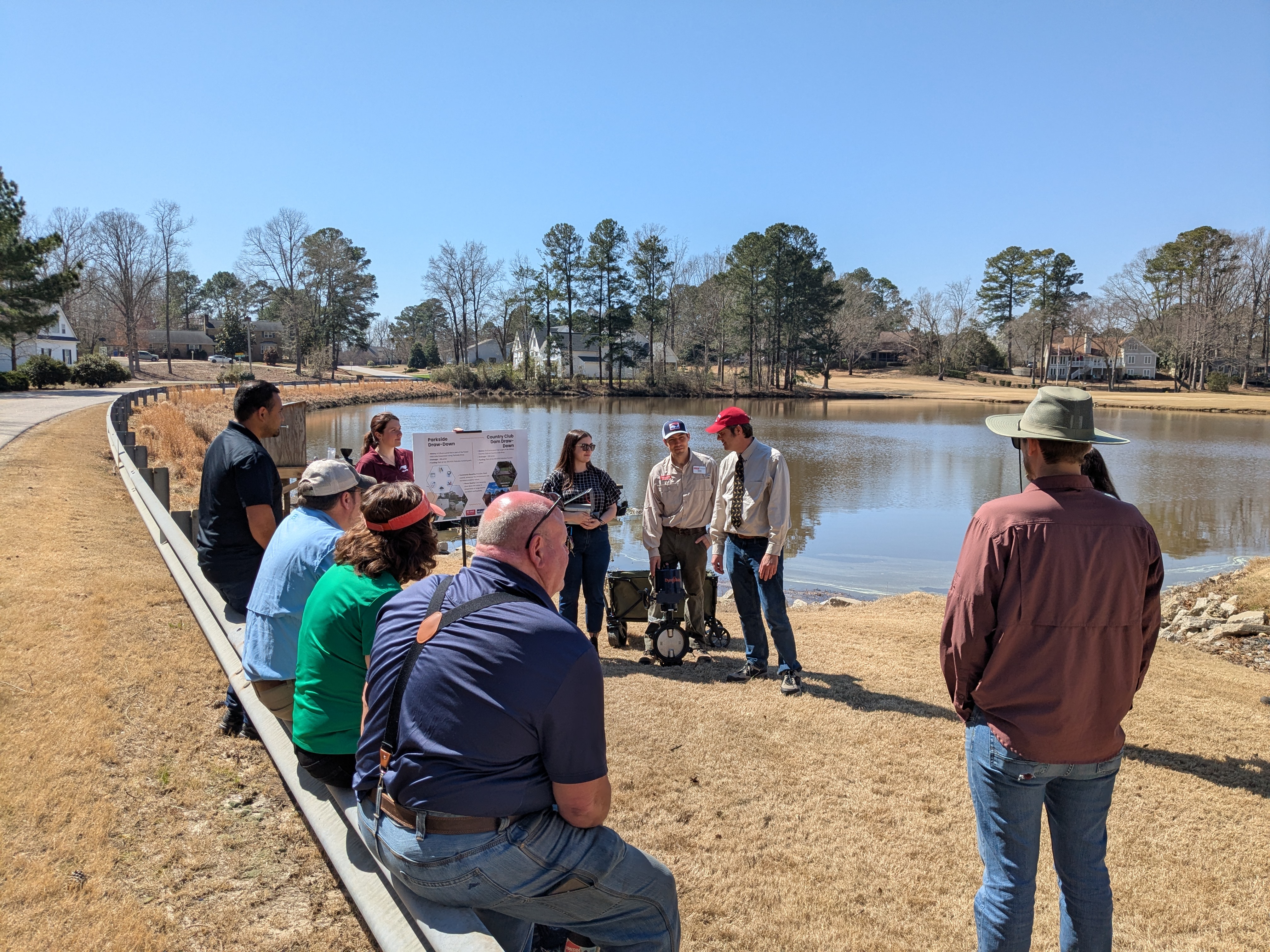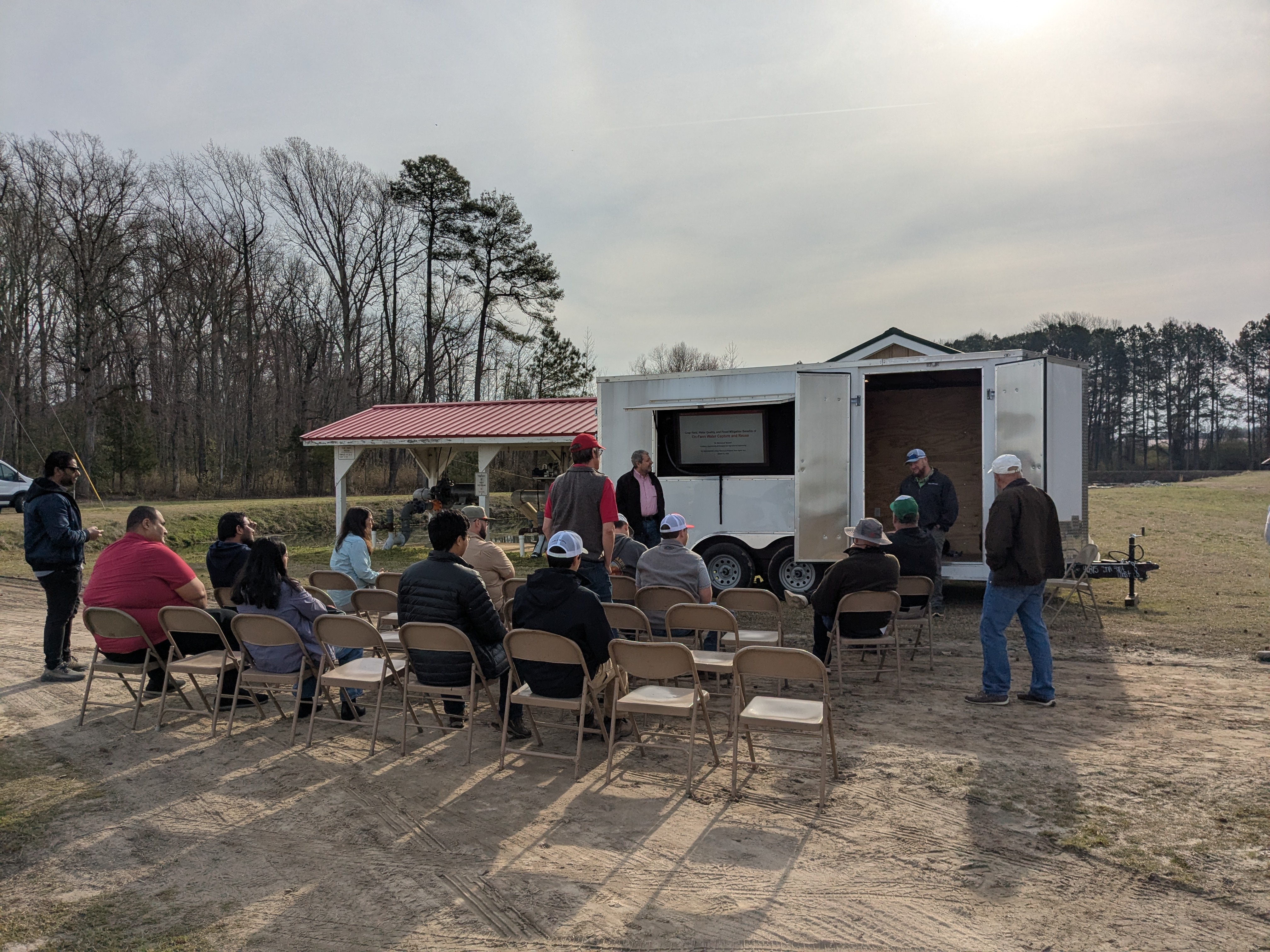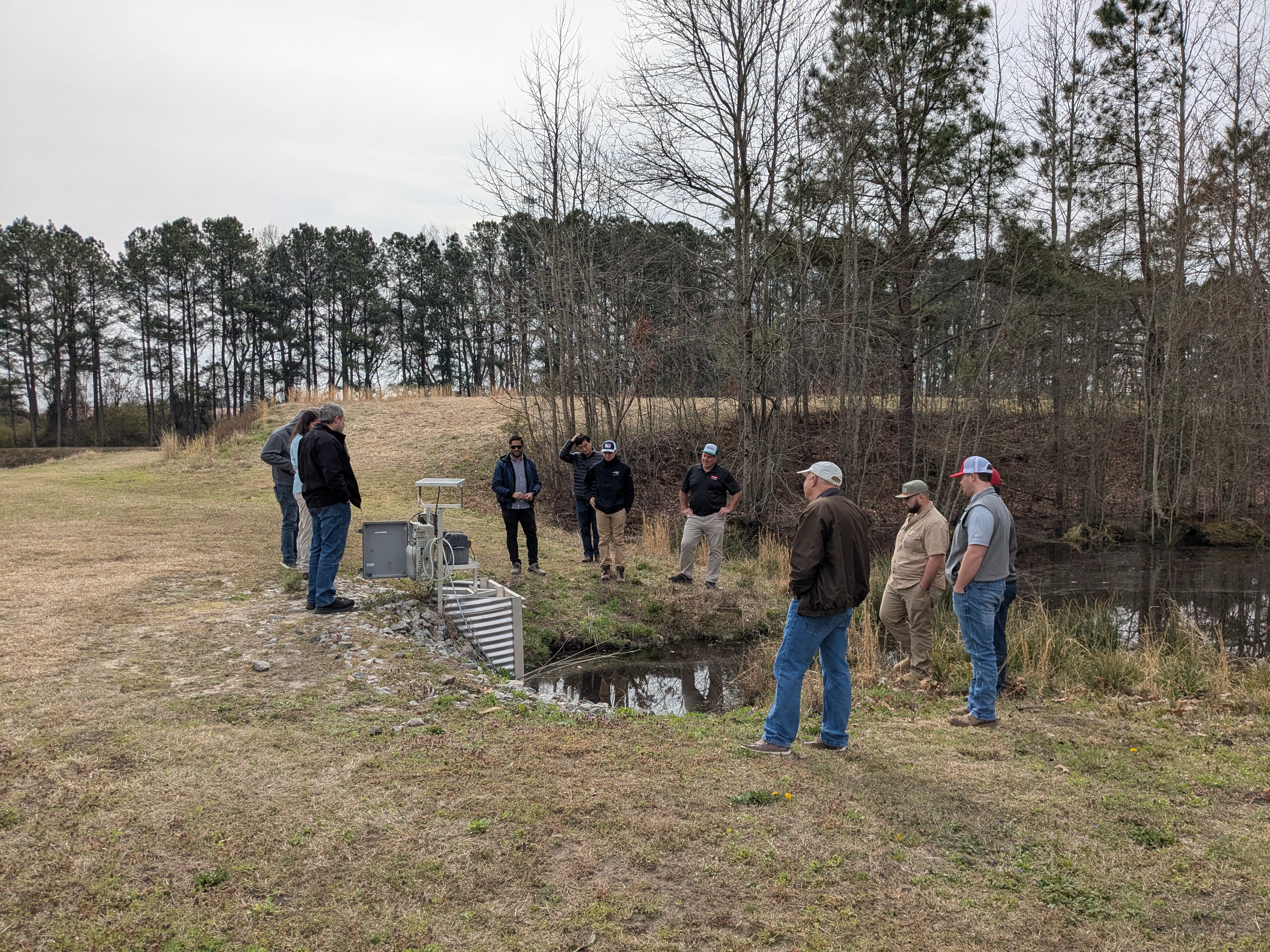Agents Attend Annual Water Resources Workshop
go.ncsu.edu/readext?1068800
en Español / em Português
El inglés es el idioma de control de esta página. En la medida en que haya algún conflicto entre la traducción al inglés y la traducción, el inglés prevalece.
Al hacer clic en el enlace de traducción se activa un servicio de traducción gratuito para convertir la página al español. Al igual que con cualquier traducción por Internet, la conversión no es sensible al contexto y puede que no traduzca el texto en su significado original. NC State Extension no garantiza la exactitud del texto traducido. Por favor, tenga en cuenta que algunas aplicaciones y/o servicios pueden no funcionar como se espera cuando se traducen.
Português
Inglês é o idioma de controle desta página. Na medida que haja algum conflito entre o texto original em Inglês e a tradução, o Inglês prevalece.
Ao clicar no link de tradução, um serviço gratuito de tradução será ativado para converter a página para o Português. Como em qualquer tradução pela internet, a conversão não é sensivel ao contexto e pode não ocorrer a tradução para o significado orginal. O serviço de Extensão da Carolina do Norte (NC State Extension) não garante a exatidão do texto traduzido. Por favor, observe que algumas funções ou serviços podem não funcionar como esperado após a tradução.
English
English is the controlling language of this page. To the extent there is any conflict between the English text and the translation, English controls.
Clicking on the translation link activates a free translation service to convert the page to Spanish. As with any Internet translation, the conversion is not context-sensitive and may not translate the text to its original meaning. NC State Extension does not guarantee the accuracy of the translated text. Please note that some applications and/or services may not function as expected when translated.
Collapse ▲On March 12-13, 2025 Extension agents from across the state converged on eastern NC to attend the Water Resources Program Team (WRPT) annual workshop. Entitled The Confluence: Water Management Across Landscapes, this was the second annual state-wide in-person Extension WRPT agent/specialist training. This educational event was developed to enhance understanding and management of water resources in both urban and farm settings.
Day 1 was hosted by the City of Wilson, who has emerged as a leader in stormwater solutions for their community. After a welcome by city officials, Extension specialists Drs. Mike Burchell and Bill Hunt kicked off the workshop, emphasizing how county agents can have a role in partnering with their local towns by helping citizens understand emerging regulations and by teaching them what they can do at their homes or communities to limit the effects of stormwater runoff. Agents then heard from Wilson engineers and stormwater managers about their many efforts over the last decade to implement innovative stormwater control measures around the city.
Dr. Bill Hunt kicks off day 1 of the event explaining how agents can work with local officials in stormwater education, planning, and troubleshooting for homeowners.
Following lunch, the group attended a tour of existing and proposed stormwater management strategies around Wilson. Staff from the city of Wilson along with Extension specialists, associates and graduate students from the NC State Department of Biological and Agricultural Engineering teamed up to show agents three existing and proposed stormwater demonstration sites including:
Wilson Country Club Flood Storage Project– A stormwater system with draw-down sensors that can be controlled remotely to help maximize flood storage and manage the release of floodwater during storms.
Wilson Mall Redevelopment and Stormwater Park – A planned project to transform a mostly abandoned mall into a park that integrates stormwater solutions to enhance water quality, property values, and public spaces.
Park Mercer Wetland– A floodplain wetland that was designed to help improve water quality and store floodwater from Hominy Creek. A pumping system lifts water from the creek and diverts it into the wetland, that helps remove pollutants and store excess flood waters during storm events (more here).
The workshop and tour on day 1 was truly a great way to bring together specialists, agents and local experts to explore how small and midsize towns can work together with Extension to implement effective stormwater management strategies and more resilient communities.
Agents in the field learning from NC State Extension faculty and graduate students about the innovative automatic flood control measures to be tested within the Wilson Country Club community.
On day two, agents and specialists loaded up and headed east to the Peanut Belt Research Station in Bertie County to learn about innovative agricultural water management practices. With the help of the station staff, we were able to set up and use the new WRPT Mobile Educational Trailer for the field day.
Dr. Mohamed Youssef, a researcher from the Department of Biological and Agricultural Engineering provided an hour-long presentation on the integrated water management demonstration site. Dr. Youssef explained the benefits of capturing runoff and drainage water to be used later for irrigation. Not only does this process conserve water but it also reduces the amount of nutrients and sediment that are lost from the farm to the surrounding watershed. Using well-timed irrigation from this reused water also can significantly improve crop yields. Producers who in the future may use such an integrated water management system will create a win-win scenario for both crop yield and water resources protection.
Mike Carroll, CED for Craven County then gave an overview of the WRPTs irrigation and pesticide source water quality program. Agents can submit samples from producers that can be analyzed for free at the NCDA lab to determine its suitability for irrigation and for mixing pesticides. For more information he can be contacted at cmcarro2@ncsu.edu.
Tour participants surrounding the new WRPT Mobile Educational Trailer learned about integrated water management to improve crop yields and protect water resources.
Following his presentation, Dr. Youssef and his graduate students provided a tour of the water management demonstration site. As participants walked the edges of the collection pond, we stopped along the way to learn about how the water was managed and the technology used to measure the flow into and out of the pond as part of the team’s ongoing research.
This water control structure and associated measurement technology helps researchers manage and measure water flow into the pond used to store runoff to be later used for irrigation.
For agents who attended, this workshop added to their water resources toolbox in both urban and agricultural locations. The workshop also demonstrated the importance and power of collaborations between agents and local agencies. At both the urban stormwater and integrated water management sites, the land -grant mission of NC State was on full display as agents could yet again see how research is extended to citizens through extension. Finally, the 2-day workshop provided a space to strengthen the connection between campus specialists and agents, the key goal of the Water Resources Program team.
Acknowledgments
Stefanie Keen (City of Wilson), Seth Nagy, and Bill Hunt all contributed to this article






